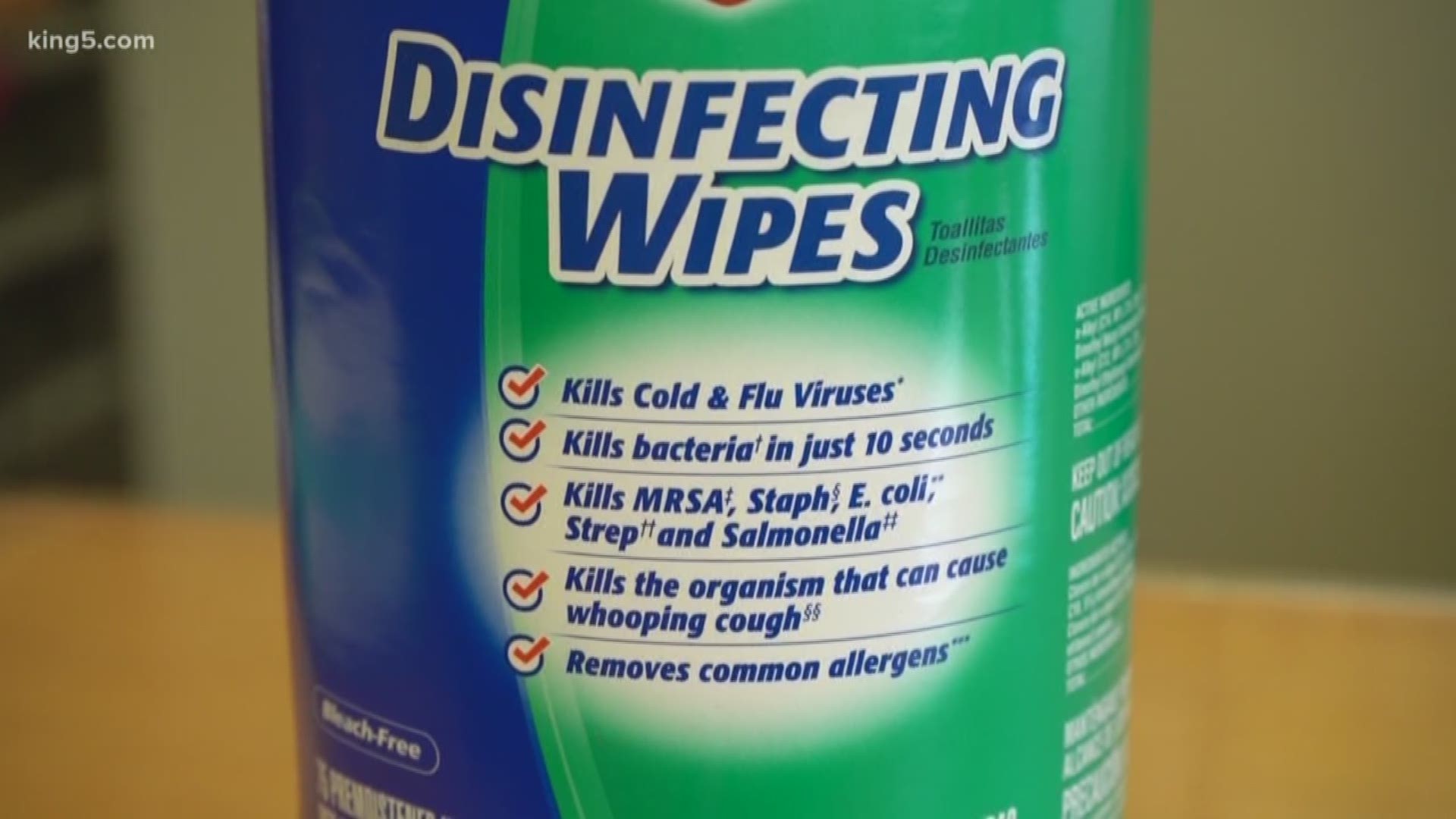The city of Tacoma's sewage system is stopped up with flushable wipes that officials say aren't really flushable at all.
While wipes labeled flushable often contain different chemicals than conventional antibacterial wipes, the latter brings another set of problems entirely.
For instance, many contain ammonium chloride.
"Your skin is very porous so it tends to absorb a lot of those chemicals and it could start creating a very strong allergy response in your body and also producing some asthma type symptoms as well," said Dr. David Ramaley of Seattle Natural Health.
Dr. Ramaley also points to the fine print on the labels, which warns consumers to wash their hands immediately after using and not to touch their eyes or other mucous membranes or put food in their mouth. The labels also say the surface area must stay wet for four minutes for the disinfectant to work fully.
Many also include the warning: "It is a violation of Federal Law to use this product in a manner inconsistent with its labeling."
In 2016, the FDA started cracking down on certain chemicals in antibacterial soaps and wipes that were shown to cause superbugs. Triclosan in soaps was banned by the FDA but it's still allowed in other products like toothpaste, facial cleansers, mouthwash, and hand sanitizers. It has been linked to issues with human fertility, development, thyroid function and immunology, and asthma.
A study performed at the University of Maine found that triclosan is a mitochondrial uncoupler. That means it is toxic to mitochondria, which are the energy powerhouses of cells. "When mitochondria are deformed or shut down, they can’t make the energy that cells need to perform functions — including immune defense," the study's 2018 press release announced.
“Consumers may think antibacterial washes are more effective at preventing the spread of germs, but we have no scientific evidence that they are any better than plain soap and water,” said Janet Woodcock, M.D., director of the FDA’s Center for Drug Evaluation and Research (CDER). “In fact, some data suggests that antibacterial ingredients may do more harm than good over the long-term.”
Beneficial bacteria are often the victims of all the sanitizing chemicals, Dr. Ramaley says, which can cause other health problems like superbugs.
"Good bacteria actually help give us healthy teeth. There are over 800 species of bacteria in our mouth and there is a lot of good bacteria that actually provide a healthy immune system to our mouth. It’s the same thing with our nasal passage. So as I mentioned, triclosan actually gets into the nasal passage and what that does is starts to produce superbugs of staph in our nasal passage. So without the good bacteria, we are going to tend to get more sinus infections and more sinus problems. You always need to have that good and bad balance, and the good bacteria in our gut produces B vitamins, it produces vitamin K. It has a lot of things for our body," Dr. Ramaley said.
Some conventional antibacterial cleaners have chemical compounds used as surfactants called alkylphenol ethoxylates, which have estrogen modeling effects. There are so many estrogenic compounds making it through the wastewater treatment process in Puget Sound that scientists have documented male salmon producing egg yolk protein, which should be limited to female salmon.
Dr. Ramaley recommends vinegar, tea tree oil, soap and water, isopropyl alcohol or hydrogen peroxide.
"Just for around your house for 99% of the things we do, soap and water is actually perfectly fine. You can kill off some of the bad bacteria you don’t want and you preserve a lot of the good bacteria. There is a time and place for some of the heavy duty cleaners but that is if you’re going into surgery or you’re in a sterile environment. We don’t need to be in a sterile environment in our daily lives. We actually want some of these bugs and that is what the research is showing. We need that to be healthy," Dr. Ramaley said.
See more environmental stories from Alison Morrow.

